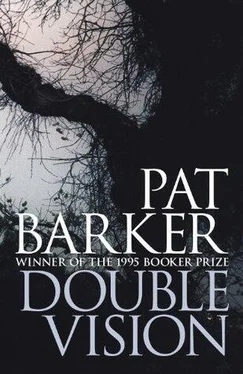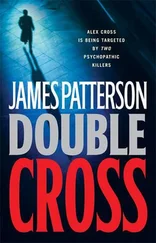She was looking at the back of the van as she thought these things, the three men standing a little to one side, talking, in clouds of breath now that the setting sun was beginning to slip behind the trees. Fred’s red tartan jacket matched the raw red of his cheeks and nose. She looked at the number plate on the van, the mud splashes, and suddenly she was back on the forest road, at night, tailing a white van. She’d forgotten that till now. Or had it been another occasion? Her mind reached back into its own darkness. No, definitely that night.
Peter’s van. How could she tell? There’d been no reason to focus on number plates then — and there must be dozens of white vans around in this area alone. Virtually every small business for miles around seemed to have a white van. And yet she felt it was Peter’s van she’d passed that night. He hadn’t mentioned seeing the accident.
Because he hadn’t seen it.
But if it was his van, he must have seen it. There was no turning after the crossroads. So he must have been the first person on the scene. If it was his van. The man who came and stood beside the car could have been Peter, but he hadn’t phoned the police. Another person turned up and did that. She could hear a voice saying, ‘…and an ambulance.’ Not Peter’s voice.
Because he hadn’t been there. He didn’t ring the police because he wasn’t there. He didn’t mention it because he wasn’t there. She was getting herself into some kind of paranoid spiral over nothing.
He was coming towards her. She framed her face muscles into a smile. ‘I’ve been thinking,’ she said. ‘Would you mind if I drove back?’
‘No, of course not. The gears are stiff, mind.’
‘I think I can manage.’
He held the door open for her, always so polite, so helpful. She climbed into the driver’s seat and leant out of the window to say goodbye to Fred.
Peter was standing by the passenger door, also saying goodbye. She turned and saw his apparently headless figure in the jacket, the only jacket he seemed to possess. Her heart bulged into her throat.
She couldn’t say anything. This might well be based on nothing more than the delusion of a semi-conscious woman, a woman who forty-eight hours later had been unable to give her own name and address to the nice young woman doctor. Who hadn’t realized she was in hospital. Who couldn’t remember the crash. No, she couldn’t mention it.
He opened the door and slid in. ‘What’s the matter?’ he asked sharply.
She remembered the incident with the glasses. Next morning she’d handed them back without comment, but somehow he knew she’d tried them on. They went straight into his pocket and never reappeared.
‘Nothing.’ She forced a small, hard laugh. ‘I’m just a bit nervous, I suppose.’
‘No, well, don’t be. I’ll keep an eye out.’
He was turning round, looking over his shoulder, doing the checking for her, as he spoke.
She took a deep breath and turned the key.
Despite his closeness to Ben, Stephen had met Kate Frobisher only twice, the last time in an art gallery where some of Ben’s photographs were being shown. Stephen had walked round the exhibition, finding some of the images very hard to take in this setting. You needed to be alone with them to achieve an honest reaction. He’d left as soon as possible after congratulating Ben.
Despite the map, he struggled to find Woodland House, which was set back from the lane behind a thick shrubbery that virtually hid it from sight. It was, as Beth said, isolated.
The spray of gravel under his wheels was as good as a burglar alarm. Kate emerged at once, arms crossed under her bosom, bending down to peer into the car with a shy, friendly smile. She was still wearing a surgical collar, though it must have been weeks since the accident. He looked for obvious marks of grief and found none, except for two broad white streaks in the dark hair that she’d bundled off her face anyhow. They hadn’t been there before, or perhaps they had, and she’d just stopped bothering to hide them. He wound down the window and she offered her hand and then immediately withdrew it, apologizing, laughing, wiping wet clay or plaster off on the already streaked side of her smock.
He got out of the car and, after a moment’s hesitation, they kissed, briefly, on each cheek. It felt foreign here, belonged in the overcrowded art gallery with trays of cheap white wine. Here in the country they didn’t know each other well enough to kiss. Answering polite inquiries about the difficulty of finding the house, he followed her over the threshold and into a stone-flagged corridor.
One ladder-backed chair, a small uncurtained window, an earthenware jug with three gigantic heads of hogweed casting an intricate pattern of shadows across the white walls. A cool, even chilly interior, but then she threw open a door and ushered him into a room full of deep reds and blues, pools of golden light from the lamps falling over books and paintings. Pale yellow sunlight flooding through the large windows made the fire burn dim.
‘Would you like a drink? Gin, wine…?’
‘White wine, please.’
While she poured, he turned to one side and there, on top of a carved oak chest, was a portrait bust of Ben — obviously her work — and powerful, he thought. Suddenly there were three people in the room, and this third presence produced a charge that was too strong, too complex, for the length of their own acquaintanceship. Stranded between small talk and the conversation they didn’t know each other well enough to have, they smiled and nodded, but found it difficult to think of anything to say. She had a streak of white plaster on her chin that was beginning to dry and flake. He was aware of wanting to brush it away with his thumb. His hand actually began to move towards her, but then he stopped, horrified by the inappropriate intimacy of the gesture.
‘That’s amazing,’ he said, pointing to the bust.
‘I’m glad you like it. I did it last summer.’
So easy and light the reference, but as she spoke the firelight leapt over the bronze face and for a moment the features seemed to move.
Lunch served at the kitchen table was simple but good. Chicken casserole, hot, crusty bread, followed by cheese and fruit.
He remembered Robert saying how much she loved the house so he asked her about that, and she became animated at once. Her face flushed — but she had been too pale before — as she told him about how she and Ben had found it, the state it was in, filthy, the old farmer who owned it had no children and so, as he sank into senility, the place had become not merely dilapidated but squalid. They’d walked round it with a torch on their first visit, dismayed by the dark rooms — the windows had been almost overgrown with ivy — but then, drifting out into the yard with an increasingly disconsolate estate agent in tow, they’d seen the outbuildings and immediately, in spite of all the work that would be needed to put it right, they’d known this was the place. Had to be. ‘Can you imagine what it would cost in London to get a place with two studios? Two million?’
‘More than that.’ It wouldn’t come cheap even here in the North, where you could get a country house with a deer park for the price of a three-bedroomed flat in Notting Hill. ‘Aren’t you nervous here by yourself?’
She shrugged. ‘People come for the weekends. Obviously, it’s quieter at this time of year.’
She genuinely didn’t seem to mind the isolation. He guessed her loneliness was the deeper kind that comes from the absence of one person, and she really didn’t care whether other people were around or not.
‘I’ve got an assistant,’ she said, after a slight pause. ‘He comes in every day except Sunday.’
Читать дальше












